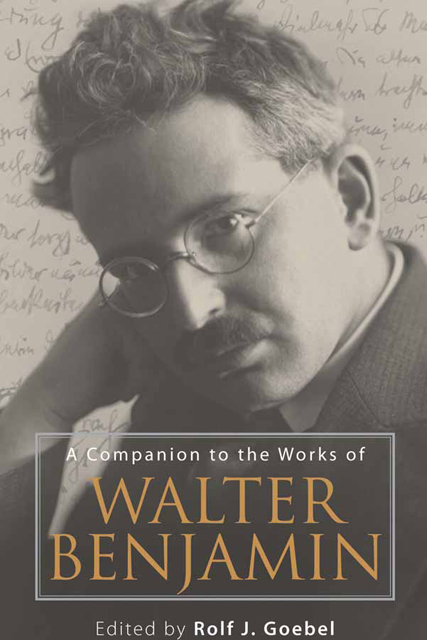Book contents
- Frontmatter
- Contents
- Preface
- Sources of Benjamin’s Works
- Chronology of Benjamin’s Major Works
- Introduction: Benjamin’s Actuality
- 1 Walter Benjamin's Criticism of Language and Literature
- 2 The Presence of the Baroque: Benjamin’s Ursprung des deutschen Trauerspiels in Contemporary Contexts
- 3 Lost Orders of the Day: Benjamin's Einbahnstraße
- 4 Literature as the Medium of Collective Memory: Reading Benjamin’s Einbahnstraße, “Der Erzähler,” and “Das Paris des Second Empire bei Baudelaire”
- 5 Benjamin in the Age of New Media
- 6 One Little Rule: On Benjamin, Autobiography, and Never Using the Word “I”
- 7 The Passagen-Werk Revisited: The Dialectics of Fragmentation and Reconfiguration in Urban Modernity
- 8 Benjamin’s Politics of Remembrance: A Reading of “Über den Begriff der Geschichte”
- 9 The Legacy of Benjamin’s Messianism: Giorgio Agamben and Other Contenders
- 10 Paris on the Amazon? Postcolonial Interrogations of Benjamin’s European Modernism
- 11 Benjamin’s Gender, Sex, and Eros
- 12 Sonic Dreamworlds: Benjamin, Adorno, and the Phantasmagoria of the Opera House
- Select Bibliography and List of Further Reading
- Notes on the Contributors
- Index
11 - Benjamin’s Gender, Sex, and Eros
Published online by Cambridge University Press: 28 February 2023
- Frontmatter
- Contents
- Preface
- Sources of Benjamin’s Works
- Chronology of Benjamin’s Major Works
- Introduction: Benjamin’s Actuality
- 1 Walter Benjamin's Criticism of Language and Literature
- 2 The Presence of the Baroque: Benjamin’s Ursprung des deutschen Trauerspiels in Contemporary Contexts
- 3 Lost Orders of the Day: Benjamin's Einbahnstraße
- 4 Literature as the Medium of Collective Memory: Reading Benjamin’s Einbahnstraße, “Der Erzähler,” and “Das Paris des Second Empire bei Baudelaire”
- 5 Benjamin in the Age of New Media
- 6 One Little Rule: On Benjamin, Autobiography, and Never Using the Word “I”
- 7 The Passagen-Werk Revisited: The Dialectics of Fragmentation and Reconfiguration in Urban Modernity
- 8 Benjamin’s Politics of Remembrance: A Reading of “Über den Begriff der Geschichte”
- 9 The Legacy of Benjamin’s Messianism: Giorgio Agamben and Other Contenders
- 10 Paris on the Amazon? Postcolonial Interrogations of Benjamin’s European Modernism
- 11 Benjamin’s Gender, Sex, and Eros
- 12 Sonic Dreamworlds: Benjamin, Adorno, and the Phantasmagoria of the Opera House
- Select Bibliography and List of Further Reading
- Notes on the Contributors
- Index
Summary
PIVOTAL MOVEMENTS OF BENJAMIN's THOUGHT are modulated by his critical, if convoluted, attention to gender, sex, and Eros. Images of esoteric love, male impotence, mass prostitution, feminine fashion, utopian lesbianism, and androgyny and hermaphroditism help formulate Benjamin's larger philosophical preoccupations with language, history, technology, metropolitan culture and society, and even with such messianic matters as awakening and redemption. They appear as recurrent motifs that evolve over the course of his oeuvre, from the earliest meditations on Eros and language in “Metaphysik der Jugend” (“The Metaphysics of Youth,” 1913–14) and on modernity's unprecedented transformation of sex in “Über Liebe und Verwandtes: (Ein europäisches Problem)” (“On Love and Related Matters: [A European Problem],” 1920), to illuminations on “esoteric love” and “revolutionary discharge” in “Der Sürrealismus: Die letzte Momentaufnahme der europäischen Intelligenz” (“Surrealism: The Last Snapshot of the European Intelligentsia,” 1929), and to culminating reflections on the allegorical impotence and “sexual shock” of “Baudelaire's erotology” in the essays and notes on Baudelaire (1935–39).
Scholars have noted the pervasiveness and importance of Benjamin's meditative images and motifs of gender, sex, and Eros, but none have attempted to bring them all together in one constellation. We might speculate as to why not. First, these images are far from simple: the images of gender are often ambiguously androgynous, while those of sex (the sexual, corporeal sexuality) and Eros (esoteric love, the spiritually erotic) are ambiguously interrelated (in pure union or daemonic mixture). Second, the character, function, and context of these images change over the course of Benjamin's writing. Third, Benjamin often interpolates these images and motifs into constellations with other, non-gendered, nonsexual, and non-erotic themes. His critics thus tend to isolate conjunctions between Eros (and/or gender and/or sex) and some other major theme of thought. Sigrid Weigel, for example, focuses on “Eros and Language,” and she offers an instructive “genealogy” of this relation. Chris Andre considers the evolving conjunction of Eros and historiography in Benjamin's writing. He identifies the axiomatic turn in Benjamin's historiographical method as occuring in the 1929 essay on “surrealism,” where Benjamin discovers Breton's technique of deploying “esoteric love” to resurrect the lost revolutionary ardor of Paris-past in a “profane illumination” of Paris-present. Andre traces Benjamin's appropriation of this technique and its melancholic (himnerotic) remaking into what ultimately becomes the optic of dialectical temporality at work in the Baudelaire essays and Das Passagen-Werk (The Arcades Project).
- Type
- Chapter
- Information
- A Companion to the Works of Walter Benjamin , pp. 246 - 272Publisher: Boydell & BrewerPrint publication year: 2009



